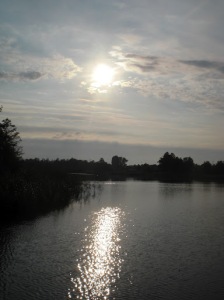Diesen Post gibt es auch auf Deutsch!
The train from Berlin to Wrocław goes through, I don’t need to change. As we are approaching the Polish boarder, we are entering Slavic lands while still in Germany: In a small train station a sign reads „Lübbenau (Spreewald)“, and another one: „Lubnjow (Błota)“ – the first is German, the second is Sorbian. The Sorbians are a Slavic minority in the Lusatia area in the easternmost corner of Germany. The letter ł on the Sorbian sign – it exists in Polish too, and it puts a smile on my face. I note down some of my thoughts in my journal. As soon as we have crossed into Poland, the train tracks are bumpier, I can tell from my own handwriting. It jolts and judders across the paper, not looking like a chain of soft, round little living creatures as it usually does, but edgy like staples or tiny wires.
Outside of the windown I see Lower Silesia pass me by. I entered this part of the world for the first time almost exactly six years ago. I’m trying to remember that day, but I can’t unearth too much from the depths of my memory. Back then I felt homesick for the first, maybe the only time in my life, and that feeling cast a shadow on so many things. It envelopped me in a large black veil that kept excitement and anticipation from coming to me like they usually do when I start a trip to the great unknown. The notion of „cudne manowce“ comes to my mind, an expression from a song by the iconic Polish poet and songwriter Edward Stachura. It means something like „the enchanting astray“. My co-worker Renata says that it can’t really be translated to German, because for the efficient and pragmatic people that we are, the astray can never be enchanting. If that is true, I’m afraid I’m not very German after all.
Now I’m looking at little villages with their Prussian architecture train station buildings and their white town hall towers reaching toward the skies with square-cut pinnacles in Tudor styled architecture. They look just like they do in Ziemia Kłodzka, which is the area I was on my way to back then, and I cannot believe that it is only – or already – six years lying between the person I am today and the person I was then.
When the train arrives at the main station in Wrocław, I can’t at first glance piece together where I am and what I am seeing. Everything is new, everything is different. The station building has been painted bright orange.
Ther concourse is light and spatious. Everything has been renovated for the football Euro Cup last June. My memory paints such a different picture – a dark, manky hellhole with rude and unfriendly elderly ladies in the ticket boxes, and myself feeling panickstricken when one night I almost didn’t get a ticket for the night train to Szczecin and thought I’d have to spend the night on the cold and smelly platform.
In the crossing underneath the platforms there used to be many kiosks and food stands – they are all gone, instead there are high tech lockers and everything is smooth and evenly tiled. I wonder what might have happened to the people who used to work in those little shops?
This is not the same place. Everything is signposted – and what’s more, bilingually so! I wish I had some of the people with me who think of Poland as backwards, grey, ugly and cheap. They would not believe their own eyes.
Two days later my train is leaving the main station in Wrocław. My seat is rear-facing and so I look straight ahead as the large orange building is moving away from me. In this moment I have the paradoxical feeling of looking aback and ahead at the same time – back to the place I am leaving right now, and that I’m missing already in a feeling of reverse homesickness. And ahead to my future that may just be so kind as to gift me with a new Polish adventure, one without feeling homesick for Germany; to a future that may grant me to understand this country better, to explore it, and with any luck even to participate in shaping it in some way.
Why do I love Poland? I have no idea. Isn’t it the purest love that doesn’t require any explanation?






































